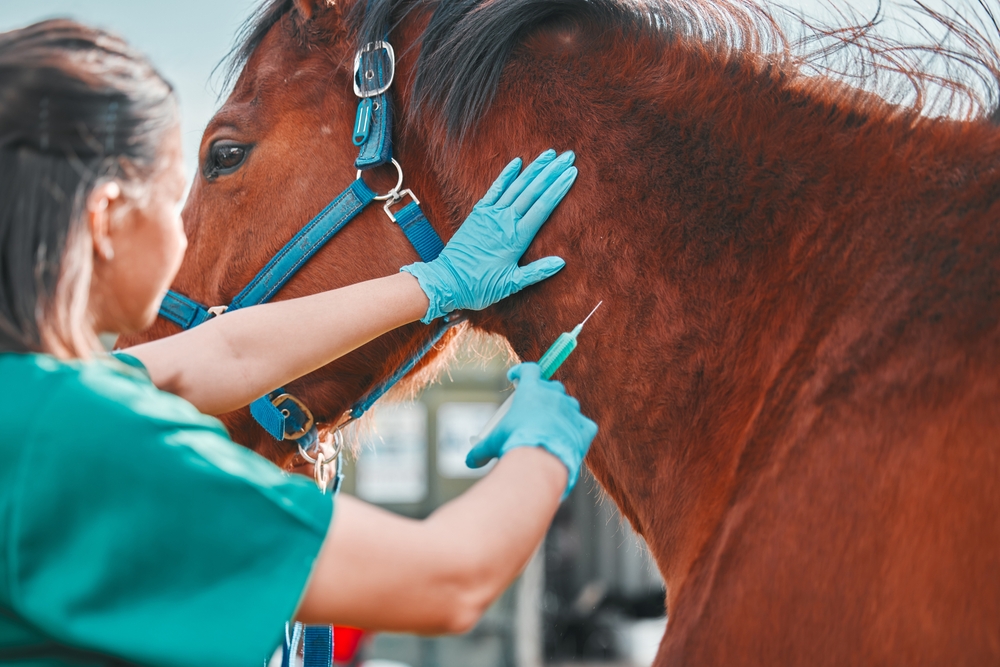A proper vaccination program is integral to preventive healthcare for horses, to protect them from infectious diseases that can cause severe illness and potentially death. The Pony Express Veterinary Hospital team knows that prevention is key to maintaining your horse’s health and well-being, and we provide an overview of essential equine vaccines.
Equine vaccination basics
Vaccines stimulate the horse’s immune system to produce antibodies against specific diseases, providing protection if the horse is exposed to those pathogens. Regular vaccination reduces the risk of disease outbreaks and improves your horse’s overall health and longevity. In addition, some vaccines are required for participation in events, travel, or for boarding at certain facilities.
Core equine vaccines
The American Association of Equine Practitioners (AAEP) categorizes vaccines in core and risk-based groups. Core vaccines are recommended for all horses based on the severity of the diseases they prevent and their widespread risk. Core equine vaccines include:
- Tetanus — Tetanus is caused by the toxin-producing bacterium Clostridium tetani, which most commonly enters the horse’s body through deep puncture wounds or lacerations. Signs include muscle stiffness, difficulty with mouth opening (i.e., lockjaw), third eyelid protrusion, noise and touch sensitivity, and a sawhorse stance (i.e., standing with rigid, extended legs and a stiff, erect tail).
- Eastern and Western equine encephalitis (EEE/WEE) — EEE and WEE are serious viral diseases that affect the horse’s central nervous system. Viral transmission occurs through an infected mosquito’s bite, with birds serving as the primary reservoir hosts. Signs include a high fever, lethargy, and neurological signs, such as incoordination, paralysis, head pressing, circling, and seizures. EEE has a higher mortality rate than WEE.
- West Nile Virus (WNV) — WNV is caused by a flavivirus that is primarily transmitted through an infected mosquito’s bite. Signs can range from mild to severe and include fever, incoordination, muscle weakness, muscle twitching, hyperexcitability, paralysis, and an inability to stand.
- Rabies — Rabies is a fatal viral disease that is primarily transmitted through an infected animal’s bite. The incubation period can vary from weeks to months. Signs include lethargy, uncharacteristic aggression, colic-like signs, incoordination, difficulty swallowing, head pressing, paralysis, and seizures. Once signs appear, the disease progresses rapidly and death occurs.
Risk-based equine vaccines
Risk-based vaccines are recommended based on your horse’s lifestyle and potential disease exposure risk. Risk-based equine vaccines include:
- Equine influenza — Equine influenza is a highly contagious viral respiratory disease. The virus is transmitted through contact with an infected horse, airborne droplets, and contaminated equipment, surfaces, or human handlers. The incubation period is typically one to five days, and signs include fever, coughing, nasal discharge, lethargy, and swollen lymph nodes.
- Equine herpesvirus (rhinopneumonitis) — Equine herpesvirus (EHV) is a group of contagious viruses that can cause diseases ranging from respiratory illness to neurological disorders and reproductive issues. EHV-1 can cause respiratory disease, abortion in pregnant mares, neonatal death, and a neurological disorder called equine herpesvirus myeloencephalopathy (EHM). EHV-4 primarily causes respiratory illness. EHV vaccines reduce the severity and spread of respiratory disease and abortion but are less effective against EHM.
- Strangles — Strangles is a highly contagious bacterial infection caused by Streptococcus equi subspecies equi. Transmission occurs through contact with an infected horse and contaminated equipment, surfaces, and human handlers. The incubation period is 3 to 14 days, and signs include fever, thick, yellow nasal discharge, lymph node swelling, difficulty swallowing, lethargy, and inappetence.
Equine vaccination program
An appropriate vaccination program helps keep your horse healthy and prevents disease spread. Considerations include:
- Veterinary consultation — Our veterinary team will help develop a customized vaccination schedule tailored to your horse’s age, lifestyle, and disease exposure risk.
- Updating — We will regularly review your horse’s vaccination schedule and update the program based on their risk changes.
- Record keeping — Our team records your horse’s vaccinations in detail, including dates, vaccine types, and booster schedules. This information is essential for travel, competition, and health management.
- Timing — We can recommend the appropriate time for your horse’s vaccines well before potential exposure, such as mosquito season or before attending events.
A comprehensive vaccination program can significantly reduce your horse’s risk of infectious disease and contribute to their overall health. Contact The Pony Express team to schedule your horse’s vaccination appointment.

